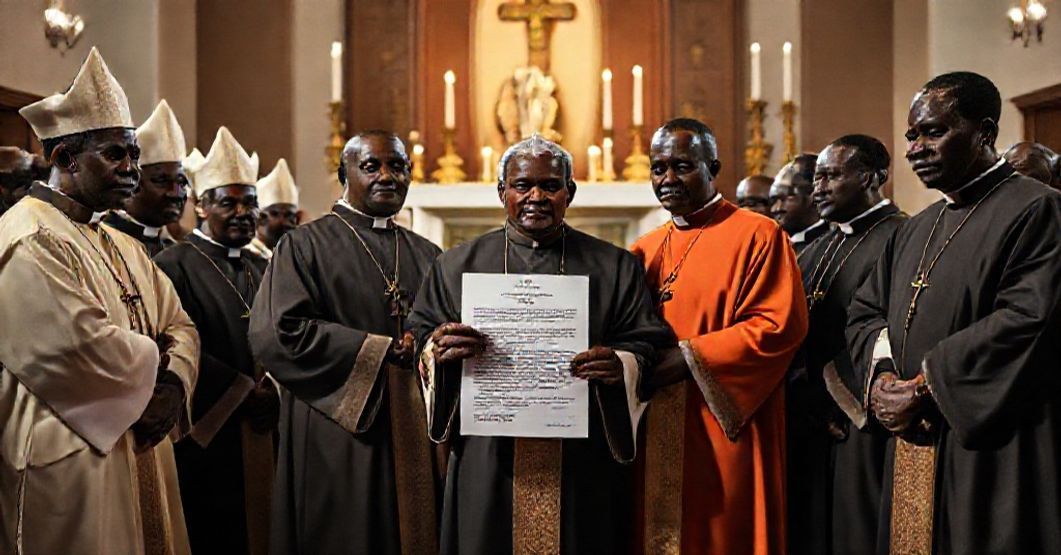Tanzanian Bishops’ Secularized Protest Reveals Conciliar Sect’s Abdication of Divine Mission
Tanzanian Bishops’ Secularized Protest Reveals Conciliar Sect’s Abdication of Divine Mission
VaticanNews portal reports (November 17, 2025) that the Tanzanian Episcopal Conference (TEC) under “Bishop” Wolfgang Pisa has endorsed calls for an independent investigation into election-related violence, condemning state brutality while appealing to constitutional rights and international opinion. The statement frames protest deaths as violating Article 14 of Tanzania’s Constitution (“The Right to Life”) and demands a secular commission involving UN agencies and NGOs to achieve “national healing.” This lamentable document exemplifies how the conciliar sect reduces the Church’s supernatural mission to naturalistic human rights advocacy.
Subordination of Divine Law to Secular Constitutionalism
The TEC statement grounds its condemnation not in Quas primas‘s declaration that “the rebellion of individuals and states against the authority of Christ has produced incalculable evils” (Pius XI, 1925), but in constitutional violations. By declaring killings “against the Constitution of Tanzania” rather than against the Eternal Law, these “bishops” commit a fundamental inversion of Catholic teaching. Pius IX’s Syllabus of Errors explicitly condemned the proposition that “the Church ought to be separated from the State, and the State from the Church” (Error 55). Yet TEC treats Tanzania’s secular constitution as the ultimate moral framework, reducing the Church to a human rights NGO.
Silence on Supernatural Realities Amid Bloodshed
Nowhere does the statement mention the eternal consequences for victims and perpetrators alike. The murdered protestors are mourned as political casualties rather than souls who faced judgment—a silence violating the Church’s duty to “warn the wicked man to turn from his way” (Ezekiel 33:8). When “Bishop” Pisa calls violence “an abomination before our God,” he ignores the greater abomination: Tanzania’s systematic rejection of Regnum Christi. As Pius XI taught, nations that “despise the laws of Christ… will hasten to their ruin” (Quas primas). The blood spilled cries not merely for earthly justice but for national repentance—a truth these modernists suppress.
Ecumenical Collaboration With Enemies of the Church
The call for an investigation “comprising international organisations, religious institutions, civil society groups, and experts in justice” constitutes explicit collaboration with forces hostile to Christ’s Kingship. The Holy Office under St. Pius X condemned such ecumenism in Lamentabili sane exitu, prohibiting alliances that imply parity between truth and error (Proposition 65). By demanding UN involvement, TEC legitimizes an organization promoting abortion and gender ideology—directly contravening Pius XI’s warning against “that false opinion which considers all religions equally good” (Mortalium animos).
Naturalism Replaces the Church’s Prophetic Voice
Reducing the Church’s mission to demanding procedural democracy (“elections lack fair competition, transparency, truth”) reveals the conciliar sect’s complete secularization. Leo XIII’s Libertas praestantissimum condemned the error that “liberty of conscience is a right proper to every man,” yet TEC champions protestors’ “right to peaceful demonstration” as the highest good. True shepherds would denounce Tanzania’s abandonment of its baptismal vows—not lament its “loss of respect in the eyes of the international community.”
Theological Bankruptcy of Conciliar “Bishops”
These modernist clerics operate entirely within the framework of Vatican II’s Gaudium et spes, which falsely claims the Church “gladly fosters and takes to herself the abilities, resources, and customs of peoples” (GS 58). Their statement embodies the condemned proposition that “Christian doctrine was initially Jewish, but through gradual development, it became… Greek and universal” (Lamentabili, Proposition 60). Having replaced the Social Reign of Christ with UN-mediated dialogue, they fulfill Pius X’s warning: “Modernists place the foundation of faith in… religious sentiment within the conscience” (Pascendi).
The Tanzanian crisis ultimately stems from the conciliar sect’s rejection of Quas primas‘s mandate: “Nations will be reminded by the annual celebration of this feast that not only private individuals but also rulers and princes are bound to give public honor to Christ.” Until “bishops” like Pisa demand Tanzania’s submission to Christ the King—not UN investigators—their political posturing remains empty theater, devoid of sanctifying grace.
Source:
Tanzania’s Catholic Bishops call for independent investigation into the election violence and deaths (vaticannews.va)
Date: 17.11.2025
